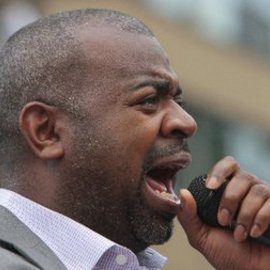Newark’s newly-elected mayor Ras Baraka has taken a bold step to address one of the city’s and state’s most serious crises.
On May 20th, Baraka persuaded his city council colleagues to adopt a resolution that will help an estimated 1,000 homeowners save their homes from foreclosure. If the proposal is implemented, the city would contract with a private investor to purchase underwater mortgages—ones for which the payment balances are higher than the fair market value of the property—and repackage them at terms homeowners can afford, based on the current market value of their homes.
“Newark families have been absolutely devastated by the foreclosure crisis,” said Baraka. “Unless we take decisive action now, the situation will only get worse.” After the crash the trustees for these mortgages—owned by dozens of distant investors as part of a pool—instead of negotiating with innocent homeowners, claimed they lack the authority to modify them.
New Jersey tops the list of states struggling to overcome the foreclosure crisis. A new report, “Underwater America: How the So-Called Housing Recovery is Bypassing Many Communities,” released by the Haas Institute at the University of California, Berkeley, found that Newark, Elizabeth and Paterson rank #2, #3 and #4 among the cities with the highest percentage of underwater homes.
“Newark voters elected the right candidate to lead the City in a new direction,” said Trina Scordo, executive director of NJ Communities United, (NJCU) a growing grassroots force made up of low- and moderate-income Newark residents.
Working with Baraka and council leaders, NJCU is committed to using its grassroots power to help make sure Baraka’s plan succeeds.
The city will begin the effort by asking the companies that own or service the underwater mortgages to sell them to the city through a third party.
If they refuse, the city will use its eminent domain authority to purchase the loans at current market value, based on appraisals. The city will work with an investor to sell the mortgages back to existing homeowners at the current value. Not only will families be able to stay in their homes, but the money they save on mortgage payments will be spent in the local economy, helping to sustain and grow local businesses.
Using the city’s power of eminent domain to modify the underwater mortgages will address blight caused by vacant and abandoned homes, and save residents from becoming homeless.
NJCU, which lobbied for this plan, appears to be playing an important grassroots role by linking and mobilizing Newark’s residents in support of Baraka’s agenda.
Baraka’s agenda won’t come easily. His foreclosure proposal, which is similar to one proposed in Richmond, California, is controversial and will face strong opposition.
But he appears to understands what liberals too often ignore. To be successful at politics and policy requires a combination of “inside” political maneuvering and “outside” mobilizing and protest. We’ll soon learn how adept Baraka (the insider) and NJCU (the outsider community group) are at joining forces to make Newark a more livable city.
(A version of this op-ed appeared in the New Jersey Star-Ledger on June 25, 2014.)






Comments